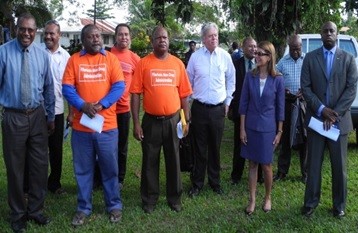For Immediate Release

The United States Agency for International Development (USAID), through its implementing partner FHI 360, is addressing tropical disease endemics in Papua New Guinea.
After training local health center supervisors and village volunteers, USAID launched the local distribution of drugs to eliminate elephantiasis in the Province of New Ireland on May 5 in Kavieng.
The provincial government has committed K250, 000 per year over the next four years and the drugs were donated by two multinational pharmaceutical companies: GlaxoSmithKline and EISAI.
In Papua New Guinea, one of the factors impeding development is the high burden of communicable diseases. Particularly in remote populations, neglected tropical disease infections are prevalent. One of the most predominant diseases is Lymphatic Filariasis, or elephantiasis, which is endemic in at least 61 out of 89 districts in Papua New Guinea, with approximately 5.2 million people at risk.
The World Health Organization recommends annual mass drug administration for all endemic populations as the most efficient measure to control neglected tropical diseases, including Lymphatic Filariasis.
As part of it End Neglected Tropical Diseases in Asia Project (END in Asia), FHI360 collaborated with the National Department of Health and the World Health Organization to pilot a comprehensive Lymphatic Filariasis Elimination Program in New Ireland Province. The program included training of local health center supervisors who will be responsible for oversight of the drug administration campaign. FHI360 also trained over 600 village volunteers on how to organize the local distribution of drugs, manage any adverse effects, and report on coverage results.
The project’s target is to reach 126,000 people, or 80% of the province’s total at risk population. If New Ireland Province is able to maintain the annual distribution of these drugs, with high coverage, elephantiasis will be eliminated from the province in five to six years.
With the success of this pilot project, END in Asia will assist the National Department of Health to expand the program during subsequent years to cover as many of the endemic areas as possible—as soon as possible—with high quality, comprehensive, and well-managed control and elimination efforts.
U.S. Health Attaché to PNG, Dr. Carlos Williams said “Neglected tropical diseases affect the health of over one billion people worldwide, with over two billion people at risk, especially among those living in poverty in remote rural areas or urban slums. Children are disproportionately affected and can live with the consequences their whole lives, including severe physical pain, irreversible disability, gross disfigurement, mental impairment, and in some cases death”.
FHI 360 implements END in Asia to help governments across the region fill in crucial gaps, expand their national NTD elimination, and control efforts. FHI 360 is an international organization working in over 60 countries in the world in areas of health, HIV/AIDS, gender-based violence, education, livelihoods research, economic development, and environment. In Papua New Guinea, FHI 360 is implementing HIV/AIDS, Gender-based violence, and health projects in the National Capital District, Madang, Western Highlands, Sundaun, Enga and New Ireland provinces since 2004.







Comment
Make a general inquiry or suggest an improvement.